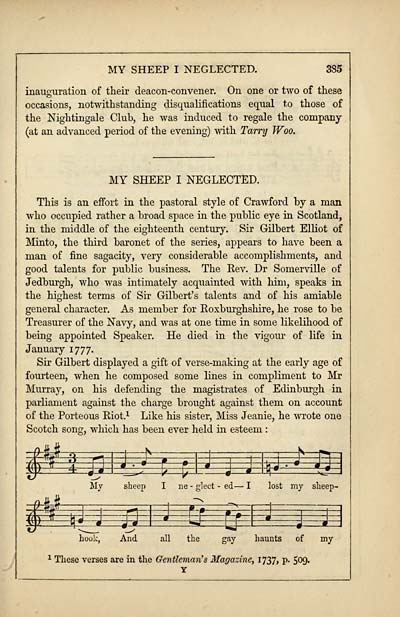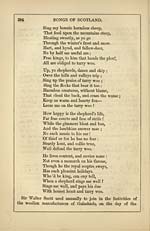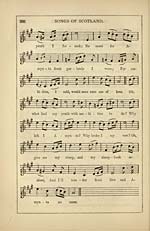Inglis Collection of printed music > Printed music > Songs of Scotland prior to Burns
(393) Page 385 - My sheep I neglected
Download files
Complete book:
Individual page:
Thumbnail gallery: Grid view | List view

MY SHEEP I NEGLECTED.
335
inauguration of their deacon-convener. On one or two of these
occasions, notwithstanding disqualifications equal to those of
the Nightingale Club, he was induced to regale the company
(at an advanced period of the evening) with Tarry Woo.
MY SHEEP I NEGLECTED.
This is an effort in the pastoral style of Crawford by a man
who occupied rather a broad space in the public eye in Scotland,
in the middle of the eighteenth century. Sir Gilbert Elliot of
Minto, the third baronet of the series, aj)pears to have been a
man of fine sagacity, very considerable accomplishments, and
good talents for public business. The Eev. Dr Somerville of
Jedburgh, who was intimately acquainted with him, speaks in
the highest terms of Sir Gilbert's talents and of his amiable
general character. As member for Roxburghshire, he rose to be
Treasurer of the Navy, and was at one time in some likelihood of
being appointed Speaker. He died in the vigoiu' of life in
January 1777.
Sir Gilbert displayed a gift of verse-making at the early age of
fourteen, when he composed some lines in compliment to Mr
Murray, on his defending the magistrates of Edinburgh in
parliament against the charge brought against them on account
of the Porteous Riot. 1 Like his sister, Miss Jeanie, he wrote one
Scotch son", which has been ever held in esteem :
Mv
&
5
m
sheep I ne - gleet - ed — I lost my sheep-
^^g^ j^^-
hook,
And
all the
gay
haunts of my
1 These verses are in the Gentleman's Magazine, 1737, p. 509-
335
inauguration of their deacon-convener. On one or two of these
occasions, notwithstanding disqualifications equal to those of
the Nightingale Club, he was induced to regale the company
(at an advanced period of the evening) with Tarry Woo.
MY SHEEP I NEGLECTED.
This is an effort in the pastoral style of Crawford by a man
who occupied rather a broad space in the public eye in Scotland,
in the middle of the eighteenth century. Sir Gilbert Elliot of
Minto, the third baronet of the series, aj)pears to have been a
man of fine sagacity, very considerable accomplishments, and
good talents for public business. The Eev. Dr Somerville of
Jedburgh, who was intimately acquainted with him, speaks in
the highest terms of Sir Gilbert's talents and of his amiable
general character. As member for Roxburghshire, he rose to be
Treasurer of the Navy, and was at one time in some likelihood of
being appointed Speaker. He died in the vigoiu' of life in
January 1777.
Sir Gilbert displayed a gift of verse-making at the early age of
fourteen, when he composed some lines in compliment to Mr
Murray, on his defending the magistrates of Edinburgh in
parliament against the charge brought against them on account
of the Porteous Riot. 1 Like his sister, Miss Jeanie, he wrote one
Scotch son", which has been ever held in esteem :
Mv
&
5
m
sheep I ne - gleet - ed — I lost my sheep-
^^g^ j^^-
hook,
And
all the
gay
haunts of my
1 These verses are in the Gentleman's Magazine, 1737, p. 509-
Set display mode to: Large image | Transcription
Images and transcriptions on this page, including medium image downloads, may be used under the Creative Commons Attribution 4.0 International Licence unless otherwise stated. ![]()
| Special collections of printed music > Inglis Collection of printed music > Printed music > Songs of Scotland prior to Burns > (393) Page 385 - My sheep I neglected |
|---|
| Permanent URL | https://digital.nls.uk/94504692 |
|---|
| Description | Scottish and English songs, military music and keyboard music of the 18th and 19th centuries. These items are from the collection of Alexander Wood Inglis of Glencorse (1854 to 1929). Also includes a few manuscripts, some treatises and other books on the subject. |
|---|
| Description | The Glen Collection and the Inglis Collection represent mainly 18th and 19th century Scottish music, including Scottish songs. The collections of Berlioz and Verdi collected by bibliographer Cecil Hopkinson contain contemporary and later editions of the works of the two composers Berlioz and Verdi. |
|---|

